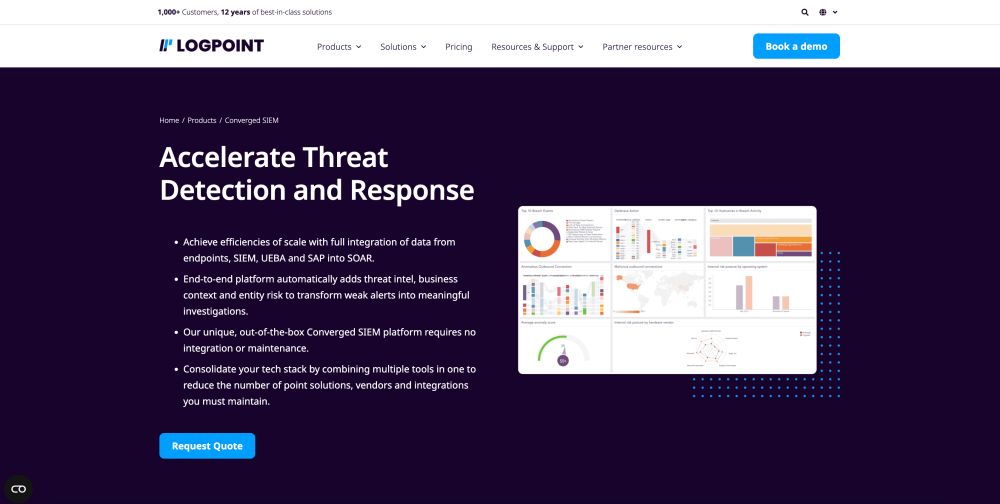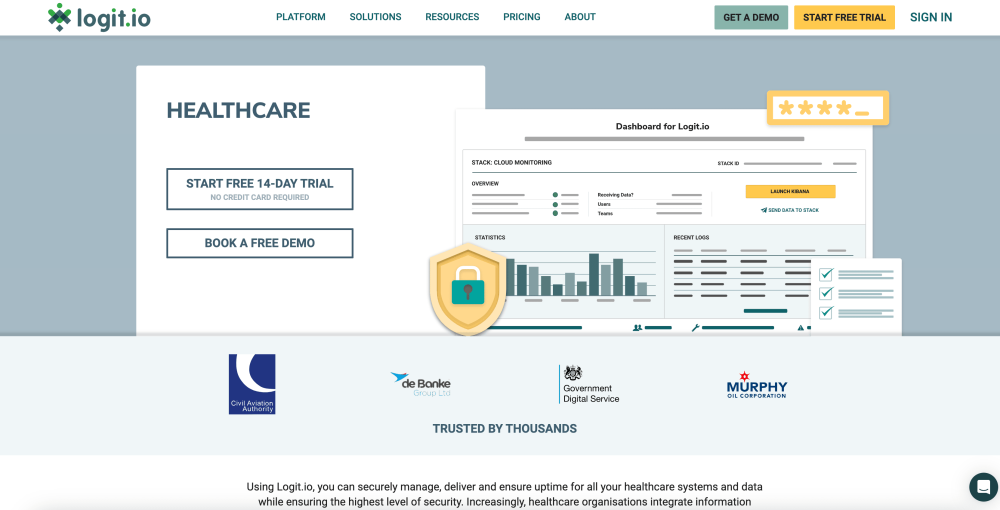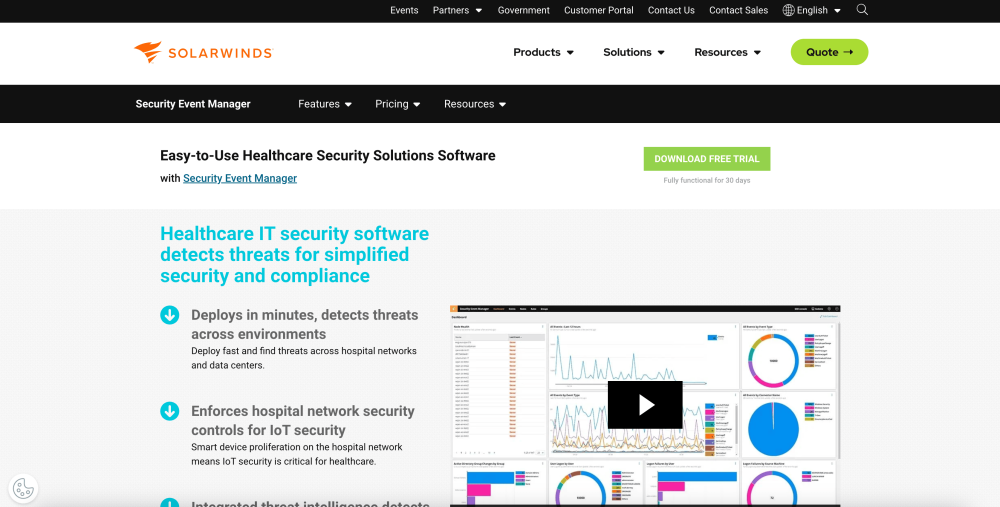Resources, Security
5 min read
The systems and data that healthcare providers utilize and process are fundamental to its successful operation. Therefore these organizations must invest in appropriate and powerful observability solutions that enable them to effectively monitor their systems and valuable data. These tools and solutions allow healthcare providers to securely manage, deliver, and ensure uptime for their entire IT infrastructure.
The patient's experiences with digital services are crucial to healthcare providers. Patients are likely to be going through a stressful period and have limited patience as a result of this. Therefore, they are expecting a simple and straightforward process where they can easily attain the information they require to make the entire experience less painful. Therefore, they are expecting a simple and straightforward process where they can easily attain the information they require, such as through a QR Code, to make the entire experience less painful.
However, the importance of effective monitoring solutions for healthcare providers isn’t solely focused on the patients' experience. These solutions can enhance security which is more crucial than ever as healthcare data breach costs have risen by 53.3% since 2020, at an average cost of $10.93 million per breach. Also, these solutions assist healthcare organizations in adhering to compliance requirements by option for a service provider that is HIPAA compliant, such as Logit.io.
Within this article, we outline what observability is and how it can enhance healthcare efficiency, as well as detail the importance of healthcare cybersecurity, before outlining the leading healthcare security solutions.
Contents
What is Observability?
Observability refers to the ability to measure the internal states of a system by analyzing its outputs, such as logs, metrics, and traces. It goes beyond traditional monitoring by offering deeper insights into how a system is functioning, allowing for more effective diagnosis and resolution of issues. Observability enables teams to comprehend the "why" behind system behaviors, not just the "what," facilitating proactive management and continuous improvement.
Observability for Enhancing Healthcare Efficiency
Attaining full visibility for healthcare providers is particularly complex due to the extensive array of medical devices that must be monitored. Therefore, organizations within the healthcare sector should focus on implementing monitoring and observability software that offers full visibility into and control over their devices, networks, applications, systems, and infrastructure.
By utilizing an observability solution, healthcare providers can gain a range of benefits. For example, healthcare systems generate an extensive amount of data, and any failures or performance issues can have direct consequences on patient care. Observability allows real-time monitoring and alerting, enabling IT teams to highlight and address issues before they escalate into critical incidents. This proactive approach aids in preventing downtime and guarantees that healthcare professionals have continuous access to vital patient information, facilitating timely and informed decision-making.
As well as this, healthcare cyber security and privacy are vital, due to the sensitive nature of patient information. Observability plays a crucial role in optimizing security by offering detailed insights into system activities and user behaviors. By monitoring logs and metrics, healthcare providers can highlight suspicious activities, such as unauthorized access attempts or unusual data transfers, and respond swiftly to potential security breaches.
Additionally, observability supports compliance with healthcare regulations by guaranteeing that all IT operations are transparent and auditable. Detailed logs and metrics offer an audit trail that can be used to demonstrate compliance with legal and regulatory standards. This transparency streamlines the auditing process and assists healthcare providers in avoiding penalties and legal complications associated with non-compliance.
The Importance of Effective Healthcare Cybersecurity
Healthcare providers and pharmaceutical organizations are often targeted by cyberattacks due to the wealth of information and intelligence of high monetary value that they possess. The main cybersecurity challenges that healthcare organizations are currently facing are:
- More privacy requirements must be met while ensuring smooth IT operations and secure data of patients.
- There’s increased complexity in the infrastructure which makes it challenging to attain centralized analysis across the organization.
- It’s difficult to detect cybersecurity threats across complex IT infrastructures, including advanced persistent threats and insider threats.
- The rising amounts of data mean analysis and cybersecurity operations are more expensive.
- Compliance requirements are increasingly difficult and resource-consuming to adhere to.
Implementing effective cybersecurity practices via a healthcare security monitoring solution can assist organizations in alleviating these challenges and enhance the overall security of their entire IT infrastructure.
With a healthcare cybersecurity solution, you can prevent ransomware attacks. Ransomware can encrypt patient records and other essential data, rendering them inaccessible until a ransom is paid. To combat this, healthcare providers implement solutions that provide advanced threat detection systems, regular data backups, and incident response plans.
Additionally, these solutions allow healthcare organizations to protect patient data. Electronic Health Records (EHRs) include highly sensitive information, such as personal details, medical histories, and treatment plans. Implementing strong encryption, access controls, and authentication mechanisms guarantees that only authorized personnel can access this information.
Lastly, by utilizing healthcare security software organizations can conduct incident detection and response. Healthcare organizations can deploy Security Information and Event Management (SIEM) systems to track network activities and find anomalies in real time. When a potential security incident is detected, a predefined incident response plan is activated. This plan includes steps for containment, eradication, recovery, and communication with stakeholders, guaranteeing a swift and coordinated response to minimize damage.
The Leading Healthcare Security Software
Logpoint Converged SIEM

Logpoint Converged SIEM is a leading healthcare security software that offers users central visibility and control of cyber events. The tool can also be utilized to achieve efficiencies of scale, offering full integration of data from endpoints, SIEM, UEBA, and SAP into SOAR. As well as this Logpoints solution collects real-time feedback on product updates and identification, enhancing the detection of new threats and optimizing security posture.
Logit.io

Logit.io’s powerful observability platform, built on the ELK stack, offers tools and solutions for the healthcare industry. The solution supports a wide range of data use cases, helping to lower IT expenses, enabling mobile access to services, and enhancing both healthcare delivery and operational efficiency. As well as this, Logit.io offers insights into the most frequently used services and those that consume the most resources. This information helps you allocate your budget effectively for development and operations upgrades. Lastly, Logit.io’s compliance with HIPAA and SOC 2, when used in conjunction with other compliant ITSM solutions, minimizes the risk of information breaches.
If you're interested in finding out more about the capabilities of the Logit.io platform for healthcare providers, feel free to contact us or begin exploring the platform for yourself with a 14-day free trial.
SolarWinds Security Event Manager

Security Event Manager from SolarWinds is a dedicated healthcare security software that is built to locate and respond to threats for lean IT operations teams protecting critical data. The solution offers an integrated cyber threat intelligence tool that helps you automatically update your security controls to detect the latest threats. Also, it offers a centralized view for SIEM event logs and includes out-of-the-box, audit-ready reports for more than just HIPAA compliance.
If you've enjoyed this article why not read A Short Guide to Secuirty Monitoring or What is NISPOM next?
